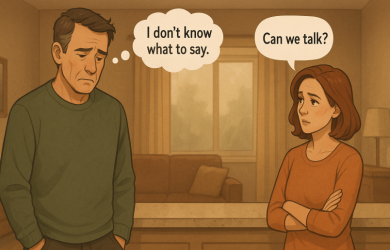10 Ways of Fighting Fair in a Relationship

Unlock Daily 30-Sec Tips for a Happier Relationship
👉 Subscribe FREEKey Takeaways
Marriage.com AI Quick Summary
Not only does every great story have conflict, but every great relationship has that as well. I always find it interesting when the question, “How’s your relationship?” is met with the response, “It’s great. We never fight.”
As though a lack of fighting is somehow a measure of a healthy relationship. Indeed, there is no benefit in physically, emotionally, or verbally abusive fighting.
But when did conflict within relationships get such a bad reputation? They don’t know the basics of fighting fair in a relationship.
Learning how to fight fair in love and marriage can help strengthen the relationship by allowing us to fight for the relationship dynamics we want, rather than settling for the current dynamics.
What does it mean to fight fair in a relationship?
Fighting fair in a relationship refers to conflicts between partners that follow some guidelines that ensure mutual respect and care.
Fighting fair in a relationship is a way of fighting where you don’t take advantage of the other person’s weaknesses; instead, you try to ensure that you can solve the problem together.
Conflict allows us to understand our partner better, build a stronger team dynamic in working together to find a resolution, and give us practice in speaking up about what we need within the relationship.
It’s not the conflict that’s bad for the health of the relationship, it’s how we go about it. Unfair fighting in relationships is what ultimately creates issues and negativity.
10 tips for fighting fair in a relationship
Learning how to fight fair in a relationship is essential to maintaining a healthy relationship with your partner. However, it is hard to figure out ways to ensure this.
Being respectful and open can help you if you are looking to learn to fight fair in a marriage or relationship. When your partner doesn’t fight fairly with you, further issues and negativity can take root.
Here are some ways to combat this by fighting fair to resolve conflict:
1. You are in charge of your own feelings
Sure, your partner can push your buttons, but you cannot control your partner, only yourself. So check in with yourself if you are trying to learn to fight fair in a relationship.
Do you know how you’re feeling?
Are your feelings manageable and do you feel in control of your words and actions?
When we become overly charged with anger or any emotion, we can lose the higher-level brain functioning needed to fight fairly and show up to a conflict in a way that makes it productive.
So if you find yourself flooded with feelings, do some self-care and maybe take a break from the fight; just let your partner know what’s going on and when you may be ready to return to the conversation.
To that point, be as expressive as you can with how you’re feeling and what you’re thinking. Your partner, no matter how long they’ve been your partner, is not a mind reader and reading intentions into the actions of others fuels conflicts.
So the next time conflict emerges in your relationship, challenge yourself to only speak about your experience and feelings.
Related Reading: 14 Tips on How to Control Your Emotions in a Relationship
2. Know what the fight is really about
Taking inventory of our feelings helps us understand what it is about our partner’s actions that triggered us. Rarely is the fight truly about forgetting the dry cleaning or being late for dinner.
More likely, the angry response to these actions stems more from a place of hurt, fear, or feeling devalued within the relationship.
The sooner you can identify the underlying source of the presenting issue, the sooner you will be able to address the actual needs that are not currently being met. And this is a crucial way of learning to fight fair in a relationship.
So rather than fighting with your partner about the money spent on a recent purchase, challenge yourself to talk about the impact of financial stress or needing support from your partner in maintaining a budget.
Knowing what the fight is truly about helps us avoid dividing the relationship by getting lost in fighting about the details of a situation and instead offers an opportunity to come together in support of a resolution. Treat this as one of the rules for fighting fairly.
3. Curiosity, not animosity
Learning how to fight fair in marriage or relationships involves realizing that conflict resolution can begin when conflict moves away from finger pointing and blaming.
Rather than assuming your partner’s intentions and placing responsibility on them for how you are currently feeling, challenge yourself to ask questions to understand better your partner and where they’re coming from.
Similarly, ask questions to understand their feelings better when your partner is hurting. This is how you can learn to fight fair in a relationship.
Healthy relationships are a two-way street, so just as it’s important to practice sharing your feelings and experience, it’s equally important to understand your partner’s feelings and experiences.
Compassion and empathy challenge feelings of animosity, and animosity is a blocker of conflict resolution. Remember, there is no designated “winner” when fighting within a relationship.
Related Reading: Open or Curious Approach of Communication in a Relationship
4. Remember language matters
The old saying, “it’s not what you said but how you said it,” holds a lot of truth. Our wording, tone, and delivery influence how our message is being received.
Fair fighting rules for couples involve being mindful of what you are saying and how you are saying it, as it can make a significant difference in the productivity of conflict. This is a big part of fighting fair in a relationship.
When we use aggressive language or nonverbal cues, we foster self-defense mechanisms that limit vulnerability and emotional intimacy, two key ingredients to strengthening relationships. An absence of these emotions can be a deterrent to fighting fair in a relationship.
It’s important to be able to express your anger, but anger does not give a free pass to use hurtful wording.
At the same time, we hear messages through the lens of our emotions, which are often heightened during times of conflict. Reflecting back to your partner on your hearing can help clarify miscommunication and ensure the intended message is received.
Lastly, as much as our wording matters, lack of wording has just as much of an impact. Avoid using the silent treatment in response to anger, as no resolution can come when one partner is checking out of the conflict.
Related Reading: What Are The 5 Love Languages®? Everything You Need to Know
5. Repair work is an integral part of fighting
Conflicts are bound to happen in relationships and offer an opportunity for growth. Fighting fairly helps make the tension of conflict productive, but the repair work after a fight helps partners reunite.
Talk about what was helpful and hurtful to you during the conflict so you can fight differently in the future. Conflicts tempt partners to disconnect, but if you can lean into one another rather than distance yourselves, your relationship has the opportunity to strengthen.
Ask yourself what you need the most from your partner to feel connected, so you can work towards repairing the bridge that separated you during a conflict. This is an excellent way to learn to fight fair in a relationship.
By honoring the hurt evoked during a conflict and showing respect for both our and our partner’s feelings, we allow the relationship the opportunity to move beyond the latest conflict.
6. Don’t be scared of fighting
Fights can seem destructive and full of negativity. They can seem like destructive parts of relationships that indicate the presence of something wrong within the relationship.
Fights can create a path for people to find a way to recognize a problem and then address it healthily. Studies show that how they fight separates happy couples from unhappy ones.
Being scared of fights can make you avoid fights by undermining your own emotions and unmet desires. It can ultimately become the cause of your unhappiness.
7. Don’t let issues pile up
Avoiding fights may allow for the problems to pile up and aggravate the negativity in the relationship. Conflicts avoided are often worse than having fights that shed light on problems within the relationship.
Address issues when they are minor and hence manageable. These minor issues can become a significant concern over time if left unaddressed.
If you are looking at multiple issues, research shows that couples who fight together stay together. Avoiding issues to avoid a fight can deteriorate the quality of the relationship.
8. Don’t withdraw or yell
Different people fight differently within the relationship. Some people choose to express their dissatisfaction or anger by shouting at their partner, while others may choose to sulk.
Shouting and silently withdrawing can set the wrong foundation for the relationship. It creates an unhealthy pattern for problem-solving and may lead to further problems and misunderstandings.
9. Express your needs clearly
Nobody is a mind reader, not even your partner.
Expecting your partner to understand your desires, needs, and overall thought process is a recipe for disaster. It can lead to misunderstandings and unrealistic expectations that create problems. Understanding how to learn fighting fair in a relationship.
Even if you are fighting with your partner, try to express what you need clearly and concisely. Instead of dropping hints or expecting the other person to guess your thoughts can ensure that the fights become directionless and unhealthy.
Related Reading: How to Communicate Your Needs in a Relationship?
10. Listen carefully
Sometimes fights are moments when you end up saying the things that affect you. However, don’t forget to listen to your partner too.
If you listen carefully to your partner during a fight, you will also get a clearer understanding of their thought process.
Furthermore, once your partner knows that you are genuinely listening to them, there will be less chance of things turning combative. This is an excellent way to learn to fight fair in a relationship.
Watch this video to learn ways to listen to your spouse in a better way:
Healthy fights for healthy relationships
Fights are a normal part of any healthy relationship; however, how you and your partner fight with each other can determine the longevity and overall health of your relationship.
Don’t avoid a fight; however, try to express yourself calmly and composedly. Try not to accuse your partner of bringing up older issues or yelling at them relentlessly.
Use fights to express and address the problems in your relationship. Use this to address the underlying and pressing problems in your relationship.
 Tips
Tips
Write your tip or submit a video tip
All tips are reviewed before the publishing.
Share this article on
Want to have a happier, healthier marriage?
If you feel disconnected or frustrated about the state of your marriage but want to avoid separation and/or divorce, the marriage.com course meant for married couples is an excellent resource to help you overcome the most challenging aspects of being married.
Related Articles
Recent Articles
Related Quizzes
Unlock Daily 30-Sec Tips for a Happier, Healthier Relationship
👉 Subscribe FREE on YouTube We'd love your feedback!
We'd love your feedback!
 Expert Q&A
Expert Q&A
Ask your question related to this topic & get the support you deserve from experts.



















 Thanks for your feedback!
Thanks for your feedback!